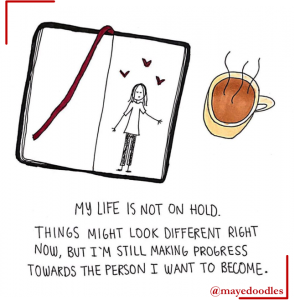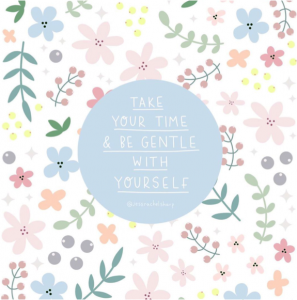We have put together a few exercises that you can download, print, and complete to assist you in finding your “new normal” as we all navigate staying at home during the COVID-19 pandemic.
Support with Creating a Daily Routine
Many people may struggle to incorporate structure during this period of self-isolation. It’s understandable, many of us do not have the same obligations we had only a couple of months ago. However, structure can help raise motivation level, reduce anxiety, and alleviate or prevent boredom. There can also be flexibility within your structured day so you do not feel pressure or anxiety to “get everything done.” For example, if you chose to exercise, you may pick an online yoga video one day, or go for a solo walk the next. You may also feel like you want a rest day from exercise and that is ok too. As long as you are consistent in your daily structure and allow yourself an essence of flexibility you can expect to stay motivated, less anxious, and less bored. Below is a chart that can help give you ideas on how to structure your day, along with an example of what a structured day may look like. Note that we did not include times in the example schedule, this is intentional. We are all unique with regard to our preferences about when we enjoy doing certain activities. Not everyone enjoys exercise in the morning, or socializing in the evening. This sheet is a guideline to help you develop a structure that works best for you and your “new normal.” Experiment with it and most of all have fun! Perhaps you have more freedom to explore doing activities in a different order than your pre-COVID-19 schedule would have allowed.
Click here for our Daily Structure in Self-Isolation Worksheet

A Time for Self-Reflection
Self-isolating has given the majority of us time to self-reflect. When days and weeks have been changing so rapidly, it can be difficult to notice how your body is adjusting and adapting. Self-reflection allows your body to process all these changes, which is very important during a time when a lot has been occurring in a short amount of time. Perhaps self-reflecting occurs naturally for you, or maybe you need a bit of prompting. Regardless of the process it takes you to reflect, just doing so can have positive mental health benefits. Self-reflection gives you the time to process what you are experiencing and allows thoughts and feelings to flow. By allowing this process of self-reflection to occur, you prevent future rumination, angst, or unresolved feelings. Self-reflection can lessen the intensity of emotions you experience in the moment and can also shed light on difficult situations, making them easier to accept. Acceptance of our current circumstances of self-isolation may not be easy for most of us, so taking a moment to reflect on the following questions may help you create a more positive state of mind.
Click here for our Self-Reflection During Self-Isolation Worksheet

 Christine is a Registered Clinical Counsellor (RCC) with the BC Association of Clinical Counsellors (BCACC). She has a Masters of Counselling degree from City University of Seattle, and postgraduate training in Clinical Traumatology from the Trauma Institute. She is currently a doctoral student in Clinical Psychology at Adler University and works privately as an RCC at Parallel Wellness.
Christine is a Registered Clinical Counsellor (RCC) with the BC Association of Clinical Counsellors (BCACC). She has a Masters of Counselling degree from City University of Seattle, and postgraduate training in Clinical Traumatology from the Trauma Institute. She is currently a doctoral student in Clinical Psychology at Adler University and works privately as an RCC at Parallel Wellness.
Christine believes in working collaboratively with individuals and couples to identify, process and work through challenges. She takes an integrative approach in therapy to address stress, anxiety, grief, depression, relationship issues and trauma. Christine uses a client-centered approach which draws on client’s strengths and past successions to problem solve for future resolution. She creates space for self-identified issues and time for healthy processing. Christine has had the most success with clients using a present-situated, strengths-based, collaborative approach to therapy that aims to promote and attain client’s goals.
Outside of counselling, Christine enjoys a balanced life of family, fitness, baking and daily mindfulness.



